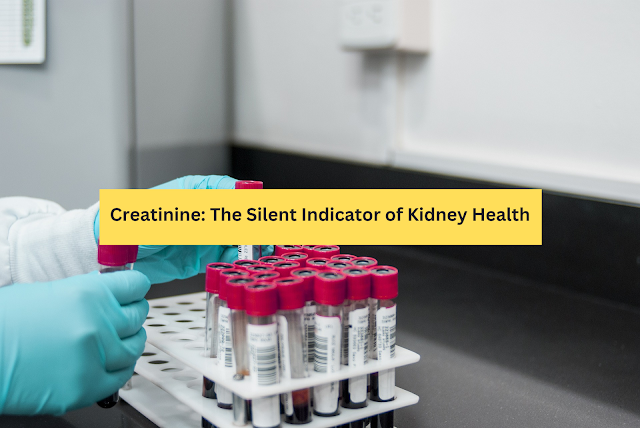Creatinine: The Silent Indicator of Kidney Health
Your kidneys are superheroes, silently filtering waste products and toxins from your blood, keeping you vital and healthy. But sometimes, these silent heroes need our attention, and one signal to listen for is creatinine.
What is creatinine?
It's a muscle breakdown product, naturally eliminated by your kidneys. Like a car's exhaust, too much creatinine indicates your kidneys might be struggling. High levels can be a red flag for underlying issues, some serious.
Why is kidney health important?
Healthy kidneys are essential for filtering blood, balancing fluids and electrolytes, and regulating blood pressure. When they falter, the consequences can be severe, affecting bone health, red blood cell production, and overall well-being.
Soaring Creatinine: Alarm Bells Ringing
Symptoms of very high creatinine levels can come on gradually or appear suddenly. Be on the lookout for:
- Fatigue and Weakness: Feeling constantly drained, like climbing a mountain with sandbags on your feet.
- Nausea and Vomiting: Your body struggling to handle toxins as they build up.
- Decreased urine output: Less pee, a potential sign your kidneys aren't filtering efficiently.
- Swelling: Puffy face, ankles, or hands from fluid buildup due to decreased filtration.
- Confusion and Difficulty concentrating: Toxins affecting your brain function.
- Metallic taste in mouth: Another indicator of metabolic imbalances caused by kidney issues.
- Treating High Creatinine: A Multi-Pronged Approach
The course of treatment will depend on the underlying cause. It may involve:
- Addressing the root cause: Treating underlying conditions like diabetes, high blood pressure, or autoimmune diseases.
- Dietary changes: Limiting protein intake to reduce strain on the kidneys. Consulting a nutritionist for a personalized plan.
- Medications: Certain drugs can help control symptoms and manage complications.
- Dialysis: In severe cases, artificial filtering of the blood may be necessary.
Living with High Creatinine: Dos and Don'ts
Here's how to take care of yourself:
DOs:
- Hydrate: Water is your kidney's best friend. Aim for eight glasses daily.
- Monitor blood pressure and blood sugar: Keeping these levels in check can protect your kidneys from further damage.
- Quit smoking: Smoking constricts blood vessels, hindering kidney function.
- Maintain a healthy weight: Excess weight puts additional strain on your kidneys.
- Exercise regularly: Moderate physical activity promotes overall health and helps manage blood pressure.
- Work with your doctor: Regular checkups and monitoring are crucial.
- Over-the-counter pain relievers: These can harm your kidneys, especially in high doses. Consult your doctor for alternatives.
- High-protein diets: Protein breakdown creates creatinine, so limiting protein intake is key.
- Alcohol and recreational drugs: These can further impair kidney function.
- Ignoring symptoms: Early intervention is vital for managing high creatinine levels and preventing complications.
- Food Choices for Kidney Health: Fruits and vegetables: Rich in antioxidants and low in protein, they nourish your body without overwhelming your kidneys.
- Whole grains: Choose fiber-rich options like brown rice and quinoa.
- Healthy fats: Opt for omega-3-rich fish, nuts, and seeds.
- Limit processed foods, sugary drinks, and saturated fats: These can burden your kidneys and overall health.
Remember: High creatinine is not a death sentence. Early detection and proactive management can slow down kidney damage and improve your life significantly. Listen to your body, get regular checkups, and follow your doctor's advice. Your kidneys will thank you for it!
Share this information with your loved ones to raise awareness about kidney health. Taking care of these silent heroes is key to a healthy and vibrant life.
Disclaimer: This blog post is for informational purposes only and should not be considered medical advice. Please consult your doctor for diagnosis and treatment of any health conditions.



0 comments:
Post a Comment